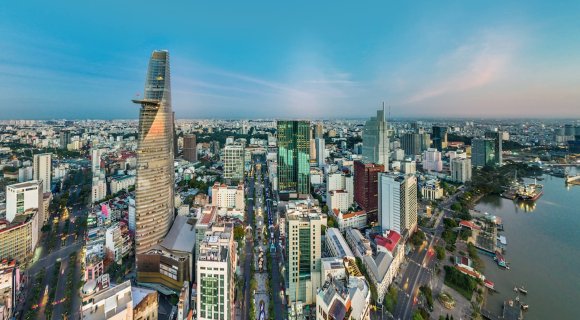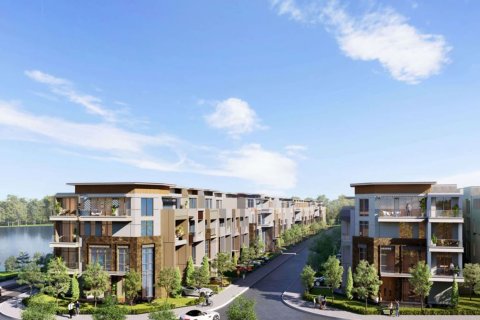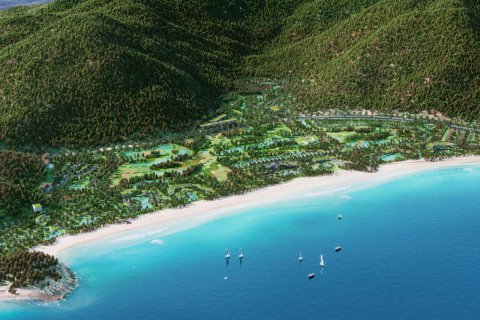
Owning real estate in Vietnam is an attractive opportunity for foreign investors for several reasons. Rapid economic development has made the country one of the fastest growing economies in the region. This means that the real estate market here is on the rise and offers opportunities for capital appreciation. In a business-friendly and investment-friendly environment, property owners know that their interests are protected and their assets are secure. In this article, you will learn about property prices in Vietnam and the process of buying property.
CONTENT:
- Rapid development in Vietnam
- Restrictions on foreigners buying property
- Best investment destinations
- Why consider investing in local real estate?
- Real estate purchase process
- Let us help you buy property in Vietnam!
Rapid development in Vietnam
It's important to note that the state offers attractive conditions for foreign investors, including incentives and business transparency. These factors contribute to the ease of doing business and reduce barriers to real estate investment. The establishment of large multinational corporations in Vietnam, such as Lego, Nike, and Samsung, demonstrates the confidence of foreign companies. The presence of these companies indicates a favorable environment for business and investment. In addition, stable political leadership and strong governance contribute to a high level of loyalty to the Vietnamese government. Finally, the country's impressive GDP growth of 8.02% in 2022 indicates significant economic growth potential, giving investors reason to expect high returns on investment.
Restrictions on foreigners buying property
According to Vietnam's 2014 Housing Law, foreign investors have the right to purchase apartments and houses in the country. Here are some key aspects of the law that define property ownership rights for foreign citizens:
- You can buy a house or apartment even with only a tourist visa.
- There is no limit to the number of properties that can be purchased.
- Within a district, an investor cannot own more than 250 residential units.
- In an apartment building, you can own up to 30% of the apartments.
- A foreigner has the right to lease the land on which the property is located for up to 50 years, with an option to renew.
- If the number of private houses in a residential project is less than 2,500, foreigners can own up to 10% of the buildings in such a project.
Please note that foreigners who marry Vietnamese citizens have the right to acquire property rights.
Best investment destinations
One of the most popular destinations in Vietnam is Ho Chi Minh City, formerly known as Saigon. It is the country's largest urban center and serves not only as its economic heart, contributing 15.55% of GDP in 2022, but is also one of the fastest developing metropolises.

As the cultural and political center of Vietnam, Hanoi attracts migrants from neighboring provinces, contributing to its rapid growth. This megacity of more than 5 million people consists of 12 districts, one district-level city, and 17 rural districts.
Nha Trang, a popular coastal destination known for its picturesque beaches and luxury resorts, attracts many tourists each year. The local economy relies primarily on this sector, making it vital to the region.
Danang, another popular province, is known for its luxury resorts and beach tourism. A new international airport terminal opened in May 2017, providing a boost to infrastructure development. The development market in the resort area of Danang is of particular interest to investors.
Why consider investing in local real estate?
One of the main reasons for potential buyers to invest in Vietnam is the relative affordability of local housing compared to other countries in the region. The average price per square meter for apartments in Hanoi and Ho Chi Minh City, the largest urban centers, is approximately $1,800 in 2023. This figure is significantly lower than other Asian megacities such as Bangkok ($2,600), Kuala Lumpur ($3,400), Singapore ($14,000), and Hong Kong ($28,000). In addition, Vietnam is projected to see annual price growth of 6–8% over the next five years, providing a rapid return on investment.
Real estate purchase process
The process of buying real estate consists of several stages. The main ones are:
- Choosing a suitable property: Foreign investors often prefer to invest in apartments available in commercial residential complexes. It is recommended to select projects from reputable developers to reduce potential risks and ensure compliance with Vietnamese laws.
- Signing the purchase contract: After selecting the right house or apartment, the parties must sign a deposit agreement. The amount of the deposit will affect the valuation of the property, deadlines for fulfilling obligations, and other related conditions. Afterwards, a sales contract is signed, which outlines the rights and obligations of the parties.
- Obtaining relevant property rights: After the transaction is completed and the necessary taxes are paid, the foreign investor is required to go through the necessary procedures to obtain the Certificate of Land Use Rights and Ownership in accordance with the stated requirements.
It's important to note that each project or complex may have its own terms and payment schedules, so it's advisable to work with agents or lawyers to obtain more detailed information and assistance during the property purchase process.
After the initial payment, additional payments will be required. For example, the rate of the real estate transfer tax is determined in accordance with government regulations. The registration fee is 0.5% of the value of the property.
Let us help you buy property in Vietnam!
Our platform is an aggregator that brings together property listings from reputable agencies and reliable developers in one place. Instead of spending time searching for properties on numerous different platforms, use our platform to browse the available options quickly and conveniently. You can apply filters based on various criteria such as location, price, number of rooms and more. Start your search for high yield investment properties in Vietnam right now!










